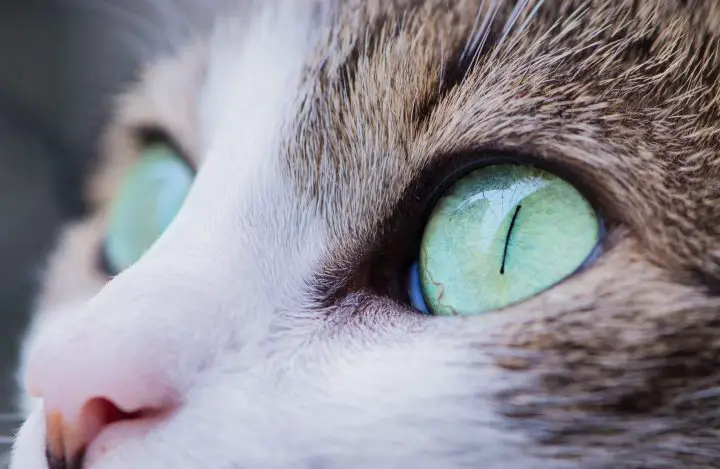You’ve probably heard that dogs have an amazing sense of smell. Is it possible that a cat’s sense of smell is even better than that of her canine friends? This is a question that many people ask when they’re trying to compare cats and dogs. So, can cats smell better than dogs? Let’s explore this question over the next few sections.
Table of Contents
- Are cats better at smelling than dogs?
- Using Smell to Mark Territory
- Cats vs Dogs: Other Senses
- Cats Sense of Smell vs Dogs: Now You Know!
- FAQs
Are cats better at smelling than dogs?
Do cats or dogs have better smell?
Most of us have heard so much about how amazing a dog’s sense of smell is. Dogs are often used for sniffing out drugs, helping recover missing persons, and hunting, so they must have an incredible sense of smell.
While it is true that dogs have a much better sense of smell than humans, cats actually have them beat in this department. Believe it or not, a cat’s sense of smell tops that of a dog—even a bloodhound!

Why do cats smell better than dogs?
So, why is it that a cat’s sense of smell is better than a dog’s?
Let’s start by exploring why scientists used to think that dogs had a better sense of smell.
Scientists used to look just at the number of scent receptors on an animal’s nose to help them rank their sense of smell. Because bloodhounds, a type of dog known for its amazing sense of smell, have about 300 million scent receptors, it was assumed that they had the better sense of smell. This is because cats only have 200 million or fewer scent receptors.
Why the change in thinking, then? Well, with more research, scientists discovered that there are actually three different types of scent receptors. The V1R receptor is the one that makes it possible for animals or humans to tell the difference between two different scents.
Humans only have 2 of these powerful V1R receptors. Dogs have 9 V1R receptors. And cats? Well, they have 30 V1R receptors—more than three times as many as dogs.
This means that even though the total number of scent receptors found in a cat’s nose is less than the number found in a dog’s nose, cats actually have a better sense of smell because they have so many more V1R receptors.
Using Smell to Mark Territory
You may have noticed that cats, particularly male cats, may mark their territory using urine, or sometimes feces. Cats do this to let others know that a certain area ‘belongs’ to them.
Scent is also important when cats are looking for a mate. Female cats who are in heat release pheromones. These strongly scented pheromones can alert a male cat that the female is ready to mate. The male’s excellent sense of smell can help it locate the female, even if she is far away.
Cats vs Dogs: Other Senses
Now that we’ve established that cats have a better sense of smell than dogs, what about the other four of the five senses? How does a cat’s sense of taste, sight, hearing, and touch compare to those of a dog?
Keep reading, and we’ll look at how these senses compare between cats and dogs.
Taste
The number of taste buds on an animal (or human’s) tongue determines how strong their sense of taste is.
As a human, you probably have about 9,000 taste buds on your tongue – which explains why so many different foods taste amazing to us!
Dogs have fewer taste buds than humans do, typically around 1,700.
So, do cats have more or less taste buds than dogs? They actually only have about 473 taste buds.
As you can probably tell now, dogs have a better sense of taste than cats. Cats rely more on their sense of smell to help them determine what they are going to eat.
When a cat is congested and their sense of smell is inhibited, it can lead to a decrease in appetite. Food isn’t as appealing when they can’t smell it. They don’t feel hungry enough if the aroma of their food doesn’t stimulate their appetite.

Sight
As far as sight goes, cats are considered the winner in this category.
While a dog’s field of vision may be a bit wider than a cat’s (240 degrees vs 200 degrees), cats are able to use a binocular focus with a range of about 140 degrees compared to the 30- to 60-degree range of a dog.
Cats and dogs also see slightly different colors. Many people assume that dogs are color-blind. However, in reality, they can see nearly all the colors of the rainbow, just not the ones that have green or red tones. This means that their color vision is about the same as a human with green-red color blindness.

Hearing
A cat’s sense of hearing is also better than that of a dog.
Once fully developed (because dogs are deaf for about the first 21 days), a dog’s hearing is approximately four times as strong as that of a human. They are able to hear sounds that travel up to a quarter mile.
However, there are nine more ear muscles in a cat’s ear. This gives them the edge in terms of hearing capabilities.
Cats are also able to discern sounds at higher frequencies than a dog. They are also better at figuring out how far of a distance the sound had to travel to reach them.

Touch
Both cats and dogs have a pretty equal sense of touch. Their paws and nerves can be relatively sensitive.
Cats and dogs both also have whiskers that help them find their way around an environment, though cats are more dependent on their whiskers than dogs are.
Cats Sense of Smell vs Dogs: Now You Know!
I don’t know about you, but I was surprised to learn that cats have a better sense of smell than dogs. Perhaps this is why more organizations are considering using cats for search and rescue missions when looking for a missing person or sniffing out bombs.
If you’ve been convinced that your cat can smell better than your dog (or other dogs you know), now you can feel confident that you were correct!
FAQs
Yes. Despite dogs having more scent receptors, a cat has more V1R receptors than dogs.
Dogs can taste things better than cats due to the number of taste buds they have compared to felines. Cats rely more on their sense of smell for tasting.




